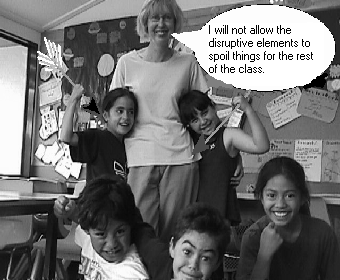or...keep the wolf from the door
or...keep body and soul together
or...make both ends meet
or...keep the wolf from the door
or...keep body and soul together
or...make both ends meet
Some
wisdom from the past...
|
|
The mind is not a vessel to be filled but a fire to be ignited . |
|
|
You cannot teach a man anything, you can only help him to find it within himself. |
|
|
What the mind can conceive and believe, it will achieve . |
I have
to suppose
That
there are those
Whose knowledge grows
![]()
But others
just doze
Or
contemplate clothes
Or soap opera woes
Or come to blows
Teaching I chose
Why? Heaven knows!
Here I am being understanding, kind, loving...
 |
![]()
Of
course, teaching ISN'T all about standing at the front of a class and TELLING...
These
days, prior to invasion, we are more likely to set up activities that will
lead to discovery of life's secrets.
But
wait, there's more!
These
activities provide precious liberty from the rag, tag and bobtails, which
can be utilised for individual conferencing - evaluating current work,setting
goals together...
![]()
PROVERBS WITH WHICH TEACHERS IDENTIFY
A candid teacher confesses
That the secret to half her success is
Not her planning as such
Nor evaluation so much
As her bright, intuitional guesses
- in one ear and out the other -
- empty vessels make the most sound -
- no rose without a thorn -
- hope for the best, prepare for the worst -
- nothing's so bad, it mightn't be worse -
- worse things happen at sea -
- the longest day must come to an end -Teachers don't THROW IN THE TOWEL
when we feel we have RUN THE GAUNTLET
instead, we PICK UP THE GAUNTLET
and follow this RULE OF THUMB :
Teach everything at least 4 times...kids need to...
see it / hear it / say it / do it
and they need to be loved, encouraged, empowered!
Over the years I have been involved in many different teaching situations, often sharing a class with another teacher for part of the day and using the release time for the following:
![]()
Enrichment modules
developed in 1998 have all been based around a problem-solving
approach. There are logical steps to take that are common to many situations
and so a problem-solving model can be followed.
Leadership, Debate, Conflict
Resolution and Research are some of the modules in which pupils have been
involved.
If you are interested
in finding out more about the way these skills are taught, email me at
dizzydeni@hotmail.com
Today I came home from school early
I took 80 children to playgrounds, you see
We went on the bus and we went to three
We went there to play but also to be
Studying structures for ' Technology'
We tested the swings and slides (weeeeeeeeeee!!!)
For appearance/appeal and for their safety
But most of all play-ability
The kids all drew plans to later study
They'll make models improving on what they did see
But that doesn't explain why I am home free
Unless you know how trying trips can be!
Ideas
:
Brainstorming
of current knowledge often leads to creation of new ideas. Edward De Bono's
"CORT" programme provides models for creation, analysis and improvement
of ideas. His 'Thinking Hats' concept works well as a vehicle for helping
children understand what sort of thinking is appropriate for a task.
Robin Fogarty's "Keep
Them Thinking" provides useful models for improving ideas.
Active
Listening :
Using positive
body language encourages a speaker. We practise eye contact, leaning forward
with an open body postion, nodding and making affirmative sounds. Role
playing these and their opposites is guaranteed to be fun!
Asking questions
and summarising to clarify meaning, are skills that require a lot of practice.
Open questions provide the speaker with an opening to share anything. Closed
questions are useful to discover details. Reflective statements and even
silence can work wonders when a speaker is not providing details.
Negotiation
is practised for use of equipment, someone's time and to achieve agreement
between peers or a leader and a group member.
Conflict
Resolution :
Understanding
the different possible reactions to conflict and choosing the most appropriate.
Aggressive, passive and assertive styles are analysed. A problem solving
model is used to develop a strategy to follow when faced with others' conflicts.
Active listening and questioning skills are necessary.
Debating
:
Arguing to a
plan. The key being a problem solving model used by the team to prepare
their approach and their actual speeches. Team work involves cooperative,
constructive peer evaluation during preparation. On-going self evaluation
and goal setting is made simple with the use of a video camera. I have
a list of topics that catch the pupil's imaginations so that motivation
to argue is not a problem! I also use templates for each speaker
postion which provide the outline and structured language as base to work
from.
MY FAVOURITE PROBLEM SOLVING MODEL :
1 Statement of
'problem' / topic/project...
2 Research
(the skills for this also need to be taught...key word notetaking, interviewing,
summarising)
3 Analysis (of
problem in light of new knowledge)
4 Brainstorm
(of any and every idea, piggyback on ideas...)
5 Action Plan
(choose the best ideas and list the steps to take to achieve them)
6 Do it...at
last...
Non
English Speaking Background (N.E.S.B.)
I have rewritten
some common nursery rhymes to help these children learn social English
and essential school vocabulary. Below are a few examples.
TO THE TUNE OF |
TO THE TUNE OF
‘TWINKLE TWINKLE LITTLE STAR’ I will work so quietly
I am going to [my room / the hall etc]
TO THE TUNE OF
(Can /May) I go and get my (book, bag, etc)?
I am sorry, so sorry
(Child’s name) has (big school bag/ colour bookbag)
|